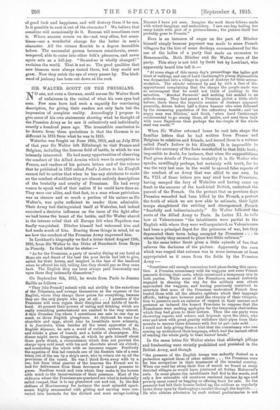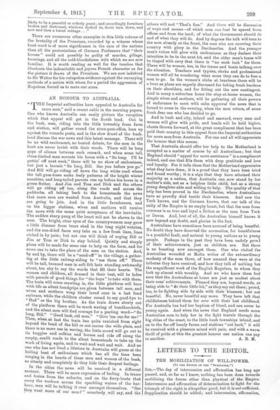of unfairness in the recital of what his own eyes
bad seen. Few men have had such a capacity for convincing description, for giving their readers nut only facts but the impression of complete reality. Accordingly I propose to give some of his own statements showing what he thought of the Prussian Army as he saw it collectively and individually exactly a hundred years ago. The irresistible conclusion to
SIR WALTER St OTT ON THE PRUSSIANS. NO one, not even a German, could accuse Sir Walter Scott
be drawn from these quotations is that the German is no different in 1915 from what he was in 1815.
Waterloo was fought on June 18th, 1815, and on July 27th
of that year Sir Walter left Edinburgh to visit France and Belgium, including the famous field of battle, in which he was Intensely interested. He had many opportunities of observing the conduct of the Allied Armies which were in occupation in France, and readers of his private letters and of the volume that he published in 1816 called Paul's Letters to his Kinsfolk cannot fail to notice that when he has any strictures to make on the conduct of soldiers they are almost entirely descriptions
of the brutality and cruelty of Prussians. He had every reason to speak well of that nation if he could have done so.
They were our allies, and that fact, to a man whose patriotism was as sincere and so much a portion of his nature as Sir Walter's, was quite sufficient to render them admirable. Their Army bad distinguished itself at Waterloo, had indeed exercised a decisive influence on the issue of the fight after we bad borne the brunt of the battle, and Sir Walter shared in the intense relief that all Europe felt when Napoleon was finally vanquished. Blucher himself bad welcomed him and
had made much of him. Bearing these things in mind, let us see how the conduct of the Prussian Army impressed him.
In Lockhart's biography we find a letter dated August 12th, 1815, from Sir Walter to the Duke of Bucoleuch from Roye in Picardy. In that letter he states :—
" As for the Prussians, a party of cavalry dining at our hotel at Mons ate and drank of the best the poor devils had left to give, called for their horses, and laughed in the face of the landlord when he offered his bill, telling him they should pay as they came back. The English they say have always paid honourably and upon these they indemnify themselves."
On September 6th, 1815, he wrote from Paris to Joanna Baillie as follows:-
"They [the French] submit with sad civility to the extortions of the Prussians, and avenge themselves at the expense of the English, whom they charge three prices for everything, because they are the only people who pay at all. . . . I question if the Prussians will soon regain their discipline and habits of hardi- hood. At present their powers of eating and drinking which aro really something preternatural are exerted to the very utmost. A thin Prussian boy whom I sometimes see eats in one clay as much as three English ploughmen. At daybreak he roars for chocolate and eggs; about nine he breakfasts more solemnly, a la fearchette, when besides all the usual apparatus of an English dAjeuner, he oats a world of cutlets, oysters, fruit, &c., and drinks a glass of brandy and a bottle of champagne. His dinner might servo Gargantua, at which he gets himself about three parts drunk, a circumstance which does not prevent the charge upon cold meat with tea and chocolate about six o'clock ; and concluding the whole with an immense supper. Positively the appetite of this lad reminds one of the Eastern tale of a man taken out of the sea by a ship's crew, who in return ate up all the provisions of the vessel. He was I think flown away with by a roe; but from what quarter of the heavens the French are to look for deliverance from those devourers I cannot presume to guess. Needless wreck and ruin which they make in the houses adds much to the inconvenience of their presence. Most of the chateaux where the Prussians are quartered are what is technically called ramped, that is to say plundered out and out. In the fine chateau of Montmorency for instance the most splendid apart- ments highly ornamented with gilding and carving were con- verted into barracks for the dirtiest and most savage-looking Hussars I have yet seen. Imagine tho work these fellows made with velvet hangings and embroidery. I saw one hag boiling her camp kettle with part of a picture-frame ; the picture itself has probably gone to Prussia."
Here is an instance of anger on the part of Blucher himself simply because payment was made to some French villagers for the hire of some donkeys commandeered for the use of the ladies of a party that made an excursion to Ermenonville. Both Blfieber and Sir Walter were of the party. This story is not told by Scott but by Lockhart, who
apparently heard him tell it :—
" At some stage of this merry day's proceedings the ladies got tired of walking, and one of Lord Castlereagh's young diplomatists was despatched into a village in quest of donkeys for their accom- modation. The attaché returned by and by with a face of dis- appointment complaining that the charge the people made was so extravagant that he could not think of yielding to the extortion. ' Marshal Forwards' said nothing but nodded to an aide-de-camp. They had passed a Prussian picket a little while before; three times the requisite number of donkeys appeared presently, driven before half a dozen hussars who wore followed by the screaming population of the refractory hamlet ; and ' an angry man was Blilcher,' said Scott, when Lord Castlereagh condescended to go among them, all smiles, and sent them back with more Napoleons than perhaps the fee-simple of the whole stud was worth," When Sir Walter returned borne he cast into shape the familiar letters that lie had written from France and Belgium to relatives and friends, and issued them in a volume called Paul's Letters to his Kinsfol7c. It is impossible to doubt the accuracy of the facts marshalled in that little book ; impossible to doubt, for instance, that when the supposititious Paul gives details of Prussian brutality it is Sir Walter who speaks, unwillingly perhaps, but certainly with truth, for he was the very last man in the world to spread false reports of the conduct of an Army that was allied to our own. In No. VIII. of those letters you may read how the Prussians, having escaped the fury of Waterloo and having come up fresh to the succour of the hard-tried British, undertook the pursuit of the French. On the pretext that on previous days Prussian wounded had been killed by the French, a pretext the truth of which we are now able to estimate, their light troops slaughtered the retiring and disorganized French "fearfully and indiscriminately." Sir Walter followed the route of the Allied Army to Paris. In Letter XI. he tells how at Valenciennes "the inhabitants were partial to the English with whom they were well acquainted, as Valenciennes had been a principal depot for the prisoners of war, but they deprecated their town being occupied by Prussians . . . in whose lenity they seemed to place but little reliance."
In the same letter Scott gives a little episode of fun that relieves the darkness of the picture. Apparently the corn which was reaped that autumn was in some instances at least
appropriated as it came from the fields by the Prussian Army :—
"Sometimes odd enough rencontres took place during this opera- tion. A Prussian commissary with his waggons met some French peasants driving their carts, which occasioned a temporary stop to both parties. While some of the Frenchmen seemed zealously engaged in clearing the way for the military men others approached the waggons, and having previously contrived to ascertain that none of the Pruasians understood French they loaded them with all the abusive epithets which that language affords; taking care however amid the vivacity of their vitupera- tion to preserve such en exterior of respect in their manner and gestures as induced the honest Prussians to suppose that the Frenchmen were making apologies for the temporary obstruction which they had given to their betters. Thus the one party were showering reguins and velours and brigands upon the other, who ever and anon with great gravity withdrew their pipes from their mouths to answer these dem:sours with Dot ist gut—sehr wohl• , . I could not help giving them a hint that the commissary who was coming up understood their language, which had the instant effect of sending the whole party to their horses' heads.'
In the same letter Sir Walter states that although pillage and freebooting were strictly prohibited and punished in the
British Army, and though
"the presence of the English troops was ardently desired as a protection against those of other nations . , . the Prussians were Par less scrupulous in their treatment of the invaded country. When our road lay along their line of march wo found as many deserted villages as would have jointured all Sultan Mahmoud's owls. In some places the inhabitants had fled to the woods, and only a few miserable old creatures rendered fearless by age and poverty came round us begging or offering fruit for sale. As the peasants had left their houses locked up, the soldiers as regularly broke them open by discharging n, musket through the keyhole.... He who obtains admission by such violent preliminaries is not
likely to be a peaceful or orderly guest; and accordingly furniture broken and destroyed, windows dashed in, doors torn down, and now and then a burnt cottage ..."
There are numerous other examples in this little volume of the brutality of the Prussians, recorded by a witness whose least word is of more significance in the care of the nations than all the protestations of German Professors that "their heroes " could not possibly be guilty of murder, pillage, burnings, and all the cold-bloodedness with which we are now familiar. It is worth reading as well for the touches that illustrate the indomitable and joyous French character as for the picture it draws of the Prussians. We are now indebted to Sir Walter for his outspoken evidence against the unvarying methods of a nation with whom for a period the aggression of Napoleon forced us to mate our arms.



































 Previous page
Previous page